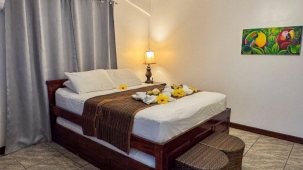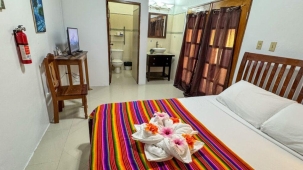Hotels
 17
17
- total square: 1580 m²
 11
11
A Guide to Hotels: Understanding Ratings, Reviews, Reliability, Features, and Pricing
Choosing a hotel can be a complex decision, influenced by factors like ratings, reviews, amenities, and pricing. Each of these elements helps shape the overall experience and ensures that guests find a stay that meets their needs and expectations. Here’s a breakdown of what to consider when booking a hotel:
1. Hotel Ratings: What Do the Stars Mean?
Hotel ratings are a widely recognized system that classifies hotels according to quality and services offered. The star rating, ranging from one to five stars, provides a snapshot of what a guest can expect:
1-Star Hotels: Basic accommodations with minimal amenities. Usually small, budget-friendly properties, ideal for travelers who prioritize affordability over luxury.
2-Star Hotels: Slightly more amenities, often including private bathrooms and basic services. These hotels are also economical and cater to budget travelers, often located near major highways or attractions.
3-Star Hotels: Offer a balance between affordability and comfort. They often feature amenities like a restaurant, fitness center, and enhanced room options, making them popular for business and leisure travelers alike.
4-Star Hotels: Known for high-quality service and a wider range of amenities, including spas, fine dining, and concierge services. They provide a luxury experience and are frequently located in city centers or popular destinations.
5-Star Hotels: The epitome of luxury, with impeccable service, high-end amenities, and elegant decor. Guests can expect personalized experiences, from in-room dining to valet parking and luxurious spas. These hotels cater to guests looking for an unforgettable, opulent stay.
2. Reviews: The Value of Guest Feedback
In the digital age, reviews are critical in determining a hotel’s reliability and service quality. Websites like TripAdvisor, Booking.com, and Google allow previous guests to share their experiences, making it easier for prospective guests to make informed decisions. When reviewing feedback:
Focus on Recent Reviews: Older reviews may not reflect the current state of the hotel, as management, services, or decor may have changed.
Look for Consistent Feedback: Pay attention to recurring themes in reviews, such as cleanliness, noise levels, or customer service quality, as they often indicate the overall quality of the hotel.
Consider Review Sources: Verified reviews from platforms that require bookings provide more accurate accounts of actual guest experiences compared to anonymous reviews.
3. Reliability and Brand Consistency
Reliability is a key factor, particularly for travelers who expect certain standards. Large hotel chains often offer consistent services and quality across locations, with established brand standards that guests can count on. Independent hotels, however, can provide unique experiences and a local touch, but it’s important to carefully evaluate reviews to assess quality and service reliability.
4. Hotel Features and Amenities
The amenities offered by a hotel significantly impact the quality of a stay. Depending on the purpose of travel—be it business, leisure, or family trips—certain features might be more desirable than others:
Business Amenities: Many hotels cater to business travelers with features like conference rooms, reliable Wi-Fi, and workspaces within rooms. Some even offer business centers and express check-out services.
Leisure and Wellness: For vacationers, features like pools, spas, fitness centers, and entertainment options enhance the experience. Resorts and luxury hotels frequently offer guided activities, golf courses, and wellness programs to attract leisure travelers.
Family-Friendly: Families may look for kid-friendly amenities such as larger rooms, suites, babysitting services, play areas, and special meal options.
Pet-Friendly: As more people travel with pets, pet-friendly hotels have become increasingly popular. They often offer designated pet areas, pet-friendly rooms, and, in some cases, pet-sitting services.
Accessibility: Accessible rooms and services are essential for guests with mobility needs. ADA-compliant rooms, ramps, and accessible dining areas ensure a comfortable stay for all guests.
5. Pricing: Finding Value for Money
Hotel prices vary greatly depending on factors like location, amenities, season, and star rating. It’s essential to balance budget with quality to find the best value:
Seasonal Rates: Many hotels adjust prices according to peak and off-peak seasons. Booking during off-peak times can significantly reduce costs.
Booking Channels: Prices may vary depending on where and how you book. Booking directly through a hotel’s website sometimes offers benefits, like free upgrades or complimentary breakfasts, that aren’t available through third-party sites.
Hidden Fees: Pay attention to potential additional costs, such as resort fees, parking, or Wi-Fi charges. Many upscale hotels charge extra for amenities, which can add up quickly.
6. Tips for Choosing the Right Hotel
When selecting a hotel, consider these factors to ensure a satisfying stay:
Define Priorities: Identify which factors are most important, such as location, amenities, or cost.
Use Comparison Sites: Websites like Hotels.com, Booking.com, and Google provide side-by-side comparisons of hotels, pricing, and reviews, which can simplify the selection process.
Loyalty Programs: If you travel frequently, loyalty programs offer exclusive perks, discounts, and even free nights. Major hotel chains have reward programs that can lead to significant savings over time.
Location and Transportation: Proximity to key attractions or transportation hubs can save time and cost on commuting. Look for nearby restaurants, shopping, or other attractions if you plan to explore the area on foot.
Final Thoughts
Understanding the differences between hotel ratings, reviewing guest feedback, and analyzing amenities and pricing can make the decision-making process much easier. Whether you’re seeking a quick stay at an economical location, a luxury escape, or a family-friendly resort, these elements guide you toward a hotel that meets your expectations and enhances your travel experience. By planning carefully, you can ensure that your next hotel stay is comfortable, convenient, and filled with value.












